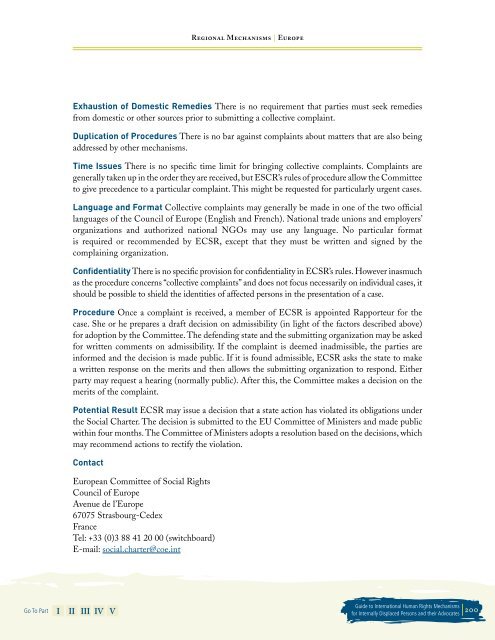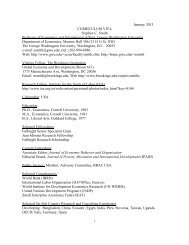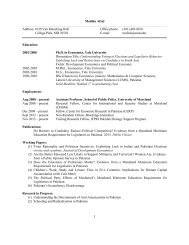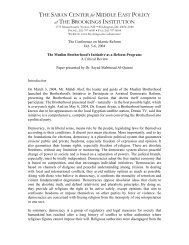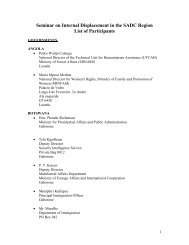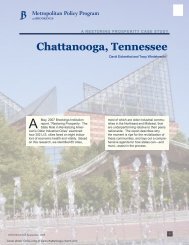Guide to International Human Rights Mechanisms - Brookings
Guide to International Human Rights Mechanisms - Brookings
Guide to International Human Rights Mechanisms - Brookings
Create successful ePaper yourself
Turn your PDF publications into a flip-book with our unique Google optimized e-Paper software.
Go To Part I II III IV V<br />
exhaustion of Domestic remedies There is no requirement that parties must seek remedies<br />
from domestic or other sources prior <strong>to</strong> submitting a collective complaint.<br />
Duplication of Procedures There is no bar against complaints about matters that are also being<br />
addressed by other mechanisms.<br />
Time issues There is no specific time limit for bringing collective complaints. Complaints are<br />
generally taken up in the order they are received, but ESCR’s rules of procedure allow the Committee<br />
<strong>to</strong> give precedence <strong>to</strong> a particular complaint. This might be requested for particularly urgent cases.<br />
language and format Collective complaints may generally be made in one of the two official<br />
languages of the Council of Europe (English and French). National trade unions and employers’<br />
organizations and authorized national NGOs may use any language. No particular format<br />
is required or recommended by ECSR, except that they must be written and signed by the<br />
complaining organization.<br />
confidentiality There is no specific provision for confidentiality in ECSR’s rules. However inasmuch<br />
as the procedure concerns “collective complaints” and does not focus necessarily on individual cases, it<br />
should be possible <strong>to</strong> shield the identities of affected persons in the presentation of a case.<br />
Procedure Once a complaint is received, a member of ECSR is appointed Rapporteur for the<br />
case. She or he prepares a draft decision on admissibility (in light of the fac<strong>to</strong>rs described above)<br />
for adoption by the Committee. The defending state and the submitting organization may be asked<br />
for written comments on admissibility. If the complaint is deemed inadmissible, the parties are<br />
informed and the decision is made public. If it is found admissible, ECSR asks the state <strong>to</strong> make<br />
a written response on the merits and then allows the submitting organization <strong>to</strong> respond. Either<br />
party may request a hearing (normally public). After this, the Committee makes a decision on the<br />
merits of the complaint.<br />
Potential result ECSR may issue a decision that a state action has violated its obligations under<br />
the Social Charter. The decision is submitted <strong>to</strong> the EU Committee of Ministers and made public<br />
within four months. The Committee of Ministers adopts a resolution based on the decisions, which<br />
may recommend actions <strong>to</strong> rectify the violation.<br />
contact<br />
European Committee of Social <strong>Rights</strong><br />
Council of Europe<br />
Avenue de l’Europe<br />
67075 Strasbourg-Cedex<br />
France<br />
Tel: +33 (0)3 88 41 20 00 (switchboard)<br />
E-mail: social.charter@coe.int<br />
Regional <strong>Mechanisms</strong> | Europe<br />
<strong>Guide</strong> <strong>to</strong> <strong>International</strong> <strong>Human</strong> <strong>Rights</strong> <strong>Mechanisms</strong><br />
for Internally Displaced Persons and their Advocates 200


